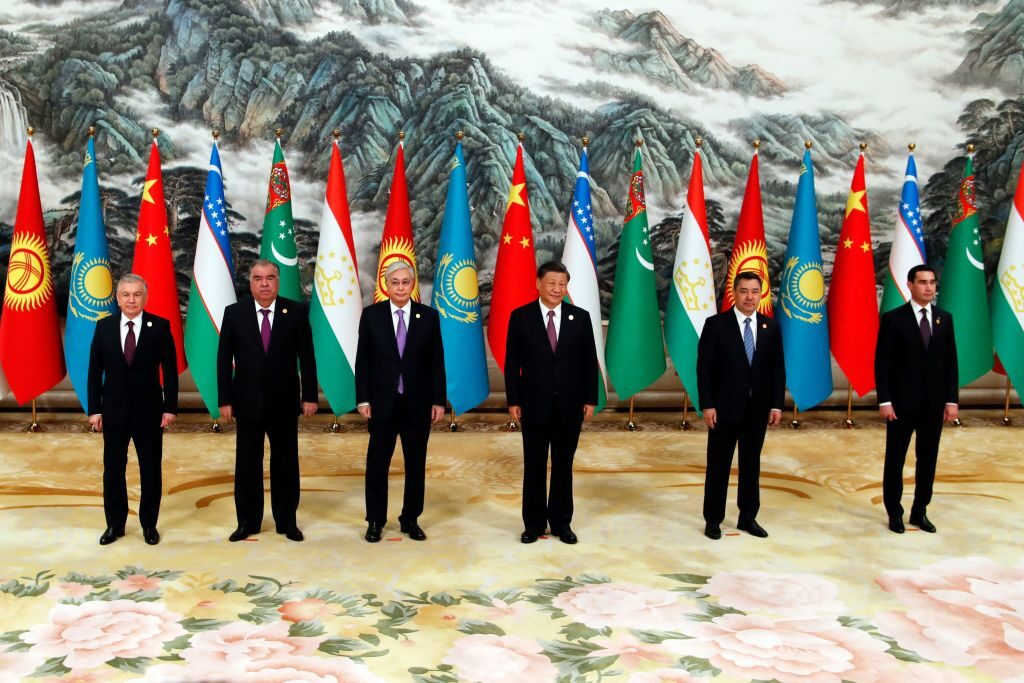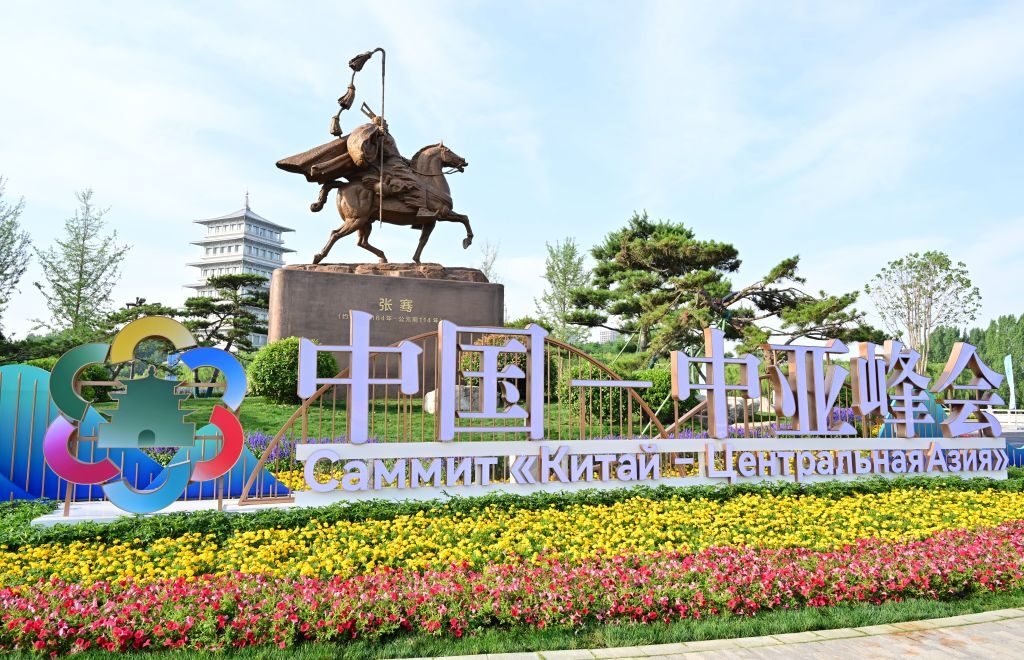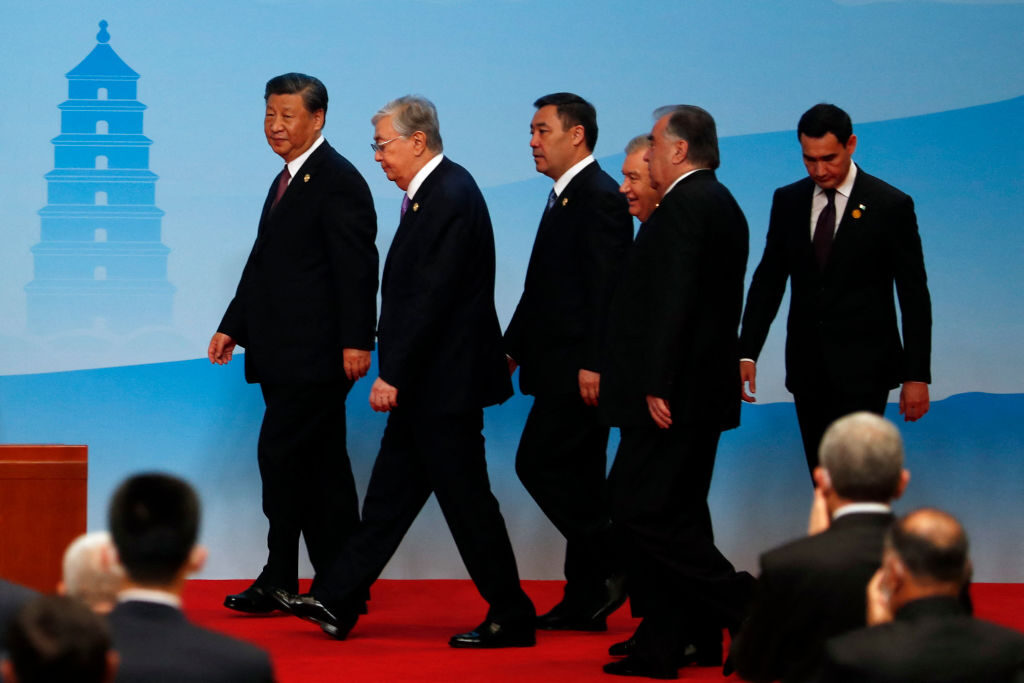Chinese state media are touting the China-Central Asia Summit, held on Thursday and Friday in the historic northwestern Chinese city of Xi...
Chinese state media are touting the China-Central Asia Summit, held on Thursday and Friday in the historic northwestern Chinese city of Xi’an, as a counter to the Group of Seven (G7) gathering of democracies in Japan this weekend, and a sharp contrast between China offering stability and financial support to its clients while U.S. President Joe Biden abandons America’s allies in the Pacific.
Xian, where the famous Terracotta Army of soldier statues was discovered in the 1970s, has deep symbolic importance to China’s agenda because it was once an imperial capital and was seen as the gateway to the Silk Road, the ancient trade route that modern China holds up as an inspiration for its Belt and Road Initiative (BRI).
The summit was held in a complex called Tang Paradise, essentially a theme park built about 20 years ago on the site of a Tang Dynasty imperial garden from the 8th Century.
“Shaanxi, as the eastern starting point of the ancient Silk Road, has witnessed the profound friendship between China and the Central Asian countries for over two thousand years,” dictator Xi Jinping said in his keynote address for the China-Central Asia Summit, referring to the province where Xi’an is located.

Chinese President Xi Jinping, Kazakhstan’s President Kassym-Jomart Tokayev, Kyrgyzstan’s President Sadyr Japarov, Tajikistan’s President Emomali Rahmon, Turkmenistan’s President Serdar Berdymukhamedov and Uzbekistan’s President Shavkat Mirziyoyev pose for a group photo during the China-Central Asia Summit in Xian, in China’s northern Shaanxi province on May 19, 2023. (FLORENCE LO/POOL/AFP via Getty)
“Throughout the centuries, the peoples of China and Central Asia have engaged in extensive exchanges, mutual learning, and created the brilliance of the ancient Silk Road, leaving a glorious chapter in the history of human civilisation and cultural exchange,” he said.
Xi invited BRI client states to “board the fast train of China’s development and jointly create a brighter future.”
China’s state-run Global Times strove to draw a contrast between the triumphalist China-Central Asia Summit and the dour G7 conference in Hiroshima, Japan, where fading Western powers gathered to shiver in hapless paranoia while China unstoppably climbs to global dominance:
Experts said that convening of the “landmark” summit, first of its kind, demonstrates Central Asia’s growing importance on China’s diplomatic agenda, and increasing significance to China’s energy and strategic security, amid complicated international and regional circumstances.
In an approximately overlapping time, leaders from G7 countries are scheduled to gather in Japan to take aim at China and Russia. Observers said China-Central Asia Summit, although not deliberately arranged at a close time with G7, sends contrast signals to the world, as G7 speaks language of outmoded Cold War mentality whilst China-Central Asia Summit’s promotion of cooperation and inclusiveness represents world development trend.
[…]
From the big picture, since the Russia-Ukraine crisis, camp confrontation mentality has gained momentum in international society. For China and Central Asian countries, cooperation can promote regional peace and stability, sending signal different from camp confrontation and avoid the world sliding into bigger confrontation, Zhao Huirong, an Eastern European studies expert from the Chinese Academy of Social Sciences, told the Global Times.
“Camp confrontation” is the Chinese Communist Party’s clunky new buzzphrase for countries that are suspicious of Beijing’s motives and wish to prevent China from conquering territory like Taiwan and the South China Sea islands through military force. A regime despised for running brutal concentration camps probably should have thought a little harder about inventing a slogan with the word “camp” in it.
On that subject, the Global Times said participants in the forum issued declarations against “terrorism” in the region, which is the Chinese Communist Party’s official cover story for the Uyghur genocide in Xinjiang province, and also a phrase China ominously uses to describe pro-democracy forces in Taiwan.
The article touted Kazakhstan embracing China’s view of “terrorism” in the region and forging a “comprehensive strategic partnership” with the regime in Beijing. Kazakhstan has the largest concentration of Uyghurs outside of China, and was once seen as ambivalent about the genocide, but appears to have formally embraced the Chinese Communist narrative.
“Those countries’ support on China’s propositions on Taiwan question and Xinjiang region demonstrates mutual support for each other’s development routes, and that we share the same idea on sovereignty, as well as security,” Chinese Academy of Social Sciences assistant research fellow Yang Jin said of the Central Asian nations gathered in Xian.

An installation promoting the China-Central Asia Summit is displayed in front of the Giant Wild Goose Pagoda on May 19, 2023 in Xi’an, Shaanxi Province of China. (Liu Yi/VCG via Getty)
The Global Times was almost comically boastful about how much carbon-spewing energy China and its Central Asian partners are planning to consume in the decades ahead. Coal and natural gas are major elements of the trade agreements Xi pursued with his guests. Xi called for faster completion of a new China-Central Asia gas pipeline during his speech and said China wants increased oil and gas trade with the region.
“China has invested billions of dollars into the pipelines, highways and railways that help bring Central Asia’s rich reserve of natural resources into China. Many Chinese cities rely on natural gas from Turkmenistan, and Kazakhstan has some of the world’s largest oil fields outside the Middle East,” the far-left New York Times (NYT) newspaper noted.
Another Global Times editorial on Thursday claimed the China-Central Asia Summit was a far better example of “multilateralism” than the G7, because the G7 nations are supposedly unreasonably suspicious of China and its bloodthirsty best friend Russia:
This is true multilateralism, which is deeply rooted and popular in the world. It is committed to tackling challenges through cooperation, addressing issues that matter to all through consultation, and pursuing unity rather than division, cooperation rather than confrontation. The China-Central Asia Summit is a concrete practice of true multilateralism. It not only promotes the development of relations between China and Central Asian countries, but also injects a clear stream into the complicated and turbulent international situation where some people deliberately muddle the water. As a result, Xi’an, the ancient capital of thousands of years, presents a new look.
The G7 summit to be held in Hiroshima, Japan, makes an instant contrastive display of pseudo-multilateralism, or defines pseudo-multilateralism. What it engages in is an exclusive and closed clique that provokes geopolitical antagonism and confrontation. Even before the G7 summit is held, it released negative information one after another. In addition to further adding fuel to the Russia-Ukraine conflict, it also targets China – its interest has been on forming groups to strengthen containment of other countries.
China is the country that routinely uses economic leverage to bully foreign governments and corporations, but in the eyes of the Global Times propagandists, the U.S. is the real-world bully because it supposedly forces the other G7 nations to be mean to China:
The hegemonic thinking of the US imposes a multiple-choice question on non-Western countries, dividing the diverse world into allies, geopolitical pawns, and geopolitical opponents or even enemies, and treating them differently. G7 countries are allies, Central Asian countries are pawns, and China is an opponent. This seems clear and distinct in Washington’s eyes. However, they will never realize the immense disrespect toward countries seen as pawns and the great malice toward countries seen as opponents. Even allies are often the bullying targets that can be blackmailed at US will. They also disregard the serious damage caused by their actions to the overall interests of humanity.
The Global Times dismissed the G7 summit as “geopolitical sewage” in a metaphor based on Japan’s plan to discharge wastewater from the damaged Fukushima nuclear reactor into the ocean, an issue China clearly hopes it can use to peel Asian democracies away from the Japan-U.S. alliance.
“The fact is that wherever [America] focuses on, there is confrontation and turmoil. From the Iraq War, the Syria War, the ‘Arab Spring’ to the Russia-Ukraine conflict, which one does not have the shadow of the U.S. and the West behind it?” the Global Times huffed, pushing the Chinese-Russian narrative that the United States somehow forced Russian President Vladimir Putin to launch his savage invasion of Ukraine.
China refuses to condemn the invasion and Xi was smart enough not to mention Ukraine at all in his address to the China-Central Asia Forum. Instead, Xi pushed a “new paradigm of deeply complementary and high-level win-win cooperation,” a pitch Reuters noted he was opportunistically making while Russia is “distracted by the war in Ukraine” and the U.S. regional presence has been diminished by Joe Biden’s disastrous withdrawal from Afghanistan.
“The five former Soviet republics, with a network of trade corridors, offer China alternative routes to transport fuel, food and other commodities in the event of disruptions elsewhere,” Reuters noted, suggesting Central Asia could give China the strategic depth to withstand supply disruptions and Western sanctions that would follow an invasion of Taiwan.

(L-R) Chinese President Xi Jinping, Kazakhstan’s President Kassym-Jomart Tokayev, Kyrgyzstan’s President Sadyr Japarov, Uzbekistan’s President Shavkat Mirziyoyev, Tajikistan’s President Emomali Rahmon and Turkmenistan’s President Serdar Berdymukhamedov arrive for the joint press conference of the China-Central Asia Summit. (FLORENCE LO/POOL/AFP via Getty)
Xi told the formerly Soviet-dominated Central Asian nations that China is ready to help them “improve their law enforcement, security, and defense capability construction,” which could be taken as an implicit promise that playing ball with Beijing means they don’t have to worry about ending up like Ukraine.
The South China Morning Post (SCMP) noted that Central Asia “has traditionally been considered Russia’s backyard,” and while its leaders are clearly uncomfortable with the invasion of Ukraine, they have been nervous about condemning it. China is therefore stepping in to “present itself as the preferred partner in the region and build economic power to counter the West.”
“Russia is the dominant power in Central Asia, but its attack on Ukraine has caused disquiet in the region. Moscow has also traditionally served as a peacekeeper, but its ability to maintain stability is in doubt after it failed to quell border skirmishes between Kyrgyzstan and Tajikistan last year,” the Financial Times (FT) observed on Friday.
FT saw China’s clear interest in shoring up Central Asian governments to prevent pro-democracy “color revolutions,” persuading those nations to buy Chinese networking equipment to extend China’s “social monitoring and control systems,” and giving China routes to project both economic power into Europe and military power into areas like Afghanistan, whose natural resources Beijing covets.